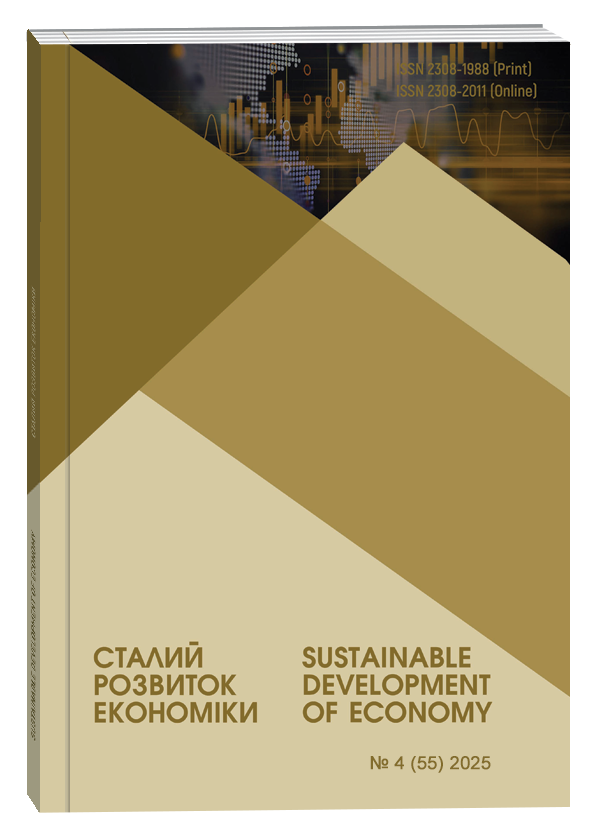DEVELOPMENT OF ACCOUNTING AND ANALYTICAL SUPPORT FOR MANAGEMENT IN THE DIGITAL ECONOMY: ONTOLOGICAL AND GNOSEOLOGICAL ASPECTS
Abstract
The development of accounting and analytical support for management in the digital economy is acquiring particular significance, as digitalization fundamentally transforms the methodological foundations of information formation, processing, and interpretation. Economic reality is increasingly represented by data generated in automated environments, which requires not only technological adaptation but also ontological and epistemological rethinking of accounting. The study aims to reveal the transformation of accounting and analytical systems through the integration of ontological and gnoseological (epistemological) approaches, highlighting their role in forming a new cognitive-digital paradigm of management information. The purpose of the article is to substantiate the essence and evolution of accounting and analytical support under the influence of digitalization, to explore the ontological shift from paper-documentary to digital-ontological models of accounting data, and to reveal the gnoseological transition from descriptive to cognitive-analytical forms of knowledge. The research applies dialectical and system-structural analysis, ontological modeling, and comparative and logical generalization to study transformations in the nature of accounting information and cognition in digital environments. The paper demonstrates that digitalization transforms accounting reality from static document-based systems into dynamic semantic networks of data. The ontological transformation is expressed in the emergence of digital-ontological data models that ensure integration, self-verification, and continuous renewal of information. The gnoseological evolution of accounting reveals a shift from descriptive fixation of facts to cognitive-analytical interpretation of data, where knowledge is algorithmically generated, continuously updated, and used for predictive management. The accountant’s role is transformed from a registrar of economic events into an interpreter of digital knowledge capable of critical evaluation of analytical algorithms and AI-generated insights. The integration of ontological and gnoseological foundations forms a new methodological paradigm of accounting and analytical support in the digital economy. Within this paradigm, data, knowledge, and algorithms constitute a unified intellectual space that provides continuity, reliability, and predictability of information. This enables the formation of intelligent accounting systems that serve as active instruments of cognition and decision-making in a digital enterprise environment.
References
Бардаш С. В., Грабчук І. Л. Цифрові технології в сфері бухгалтерського обліку: основні можливості та ризики. Ефективна економіка. 2021. № 9. URL : http://www.economy.nayka.com.ua/?op=1&z=9301 (дата звернення: 10.10.2025).
Бухгалтерський облік та оподаткування в умовах застосування інформаційних технологій: теорія і практика : монографія / В. О. Осмятченко, С. В. Шевчук, Я. О. Ізмайлов [та ін.] ; за заг. ред. В. О. Осмятченка ; Ун-т держ. фіск. служби України. Ірпінь : Ун-т ДФС України, 2020. 394 с.
Жиглей І. В., Лайчук С. М., Поліщук І. Р. Використання інформаційних технологій у бухгалтерському обліку. Економіка, управління та адміністрування. 2024. № 1 (107). С. 95–102. URL: https://eztuir.ztu.edu.ua/jspui/bitstream/123456789/8461/1/95.pdf (дата звернення: 10.10.2025)
Муравський В. В. Комп’ютерно-комунікаційна форма обліку: монографія. Тернопіль : ТНЕУ, 2018. 486 с.
Alwan A. A. Effect of using Cloud Computing technology on the accounting job. International journal of research in social sciences & humanities. 2022. Vol. 12. no. 02. URL: https://doi.org/10.37648/ijrssh.v12i02.022 (дата звернення: 10.10.2025).
Gyau E. K., Owiredu-Ghorman K., Amaning N., Kpimekuu P. B. Qualitative Analysis on Costs and Benefits of Adopting a Cloud-Based Accounting Information System: A Case Study of Rural Banks in Ghana. European Journal of Accounting, Auditing and Finance Research. 2023. Vol. 11. no. 6. URL: https://doi.org/10.37745/ejaafr.2013/vol11n67091 (дата звернення: 10.10. 2025).
Pramuka B. A., Pinasti M. Does cloud-based accounting information system harmonize the small business needs? Journal of Information and Organizational Sciences. 2020. Vol. 44. no. 1. URL: https://doi.org/10.31341/jios.44.1.6 (дата звернення: 10.10. 2025).
Zadorozhnyi Z.-M., Muravskyi V., Shevchuk O., Muravskyi V., & Zadorozhnyi M. Digitization of Accounting in the Innovative Management of Autonomous Robotic Transport. Marketing and Management of Innovations. 2024. № 15 (3). рр. 110–126.
Bardash, S. V., & Hrabchuk, I. L. (2021). Tsyfrovi tekhnolohii v bukhhalterskomu obliku: osnovni mozhlyvosti ta ryzyky [Digital technologies in accounting: main opportunities and risks]. Efficient Economy, no. 9. Available at: http://www.economy.nayka.com.ua/?op=1&z=9301 (in Ukrainian)
Osmiachenko, V. O., Shevchuk, S. V., Izmailov, Ya. O., et al. (2020). Bukhhalterskyi oblik ta opodatkuvannia v umovakh informatsiinykh tekhnolohii: teoriia ta praktyka [Accounting and taxation in the context of information technologies: theory and practice] (V. O. Osmiachenko, Ed.). Irpin: University of the State Fiscal Service of Ukraine, 394 p. (in Ukrainian)
Zhyhlei, I. V., Laichuk, S. M., & Polishchuk, I. R. (2024). Zastosuvannia informatsiinykh tekhnolohii v bukhhalterskomu obliku [The use of information technologies in accounting]. Economics, Management and Administration, no. 1(107), pp. 95–102. Available at: https://eztuir.ztu.edu.ua/jspui/bitstream/123456789/8461/1/95.pdf (in Ukrainian)
Muravskyi, V. V. (2018). Komp’iuterno-komunikatsiina forma obliku: monohrafiia [Computer-communication form of accounting: Monograph]. Ternopil: TNEU, 486 p. (in Ukrainian)
Alwan, A. A. (2022). Effect of using Cloud Computing technology on the accounting job. International Journal of Research in Social Sciences & Humanities, no. 12(2). DOI: https://doi.org/10.37648/ijrssh.v12i02.022
Gyau, E. K., Owiredu-Ghorman, K., Amaning, N., & Kpimekuu, P. B. (2023). Qualitative analysis on costs and benefits of adopting a cloud-based accounting information system: A case study of rural banks in Ghana. European Journal of Accounting, Auditing and Finance Research, no. 11(6). DOI: https://doi.org/10.37745/ejaafr.2013/vol11n67091
Pramuka, B. A., & Pinasti, M. (2020). Does cloud-based accounting information system harmonize the small business needs? Journal of Information and Organizational Sciences, no. 44(1). DOI: https://doi.org/10.31341/jios.44.1.6
Zadorozhnyi, Z.-M., Muravskyi, V., Shevchuk, O., Muravskyi, V., & Zadorozhnyi, M. (2024). Digitization of accounting in the innovative management of autonomous robotic transport. Marketing and Management of Innovations, no. 15(3), pp. 110–126.


